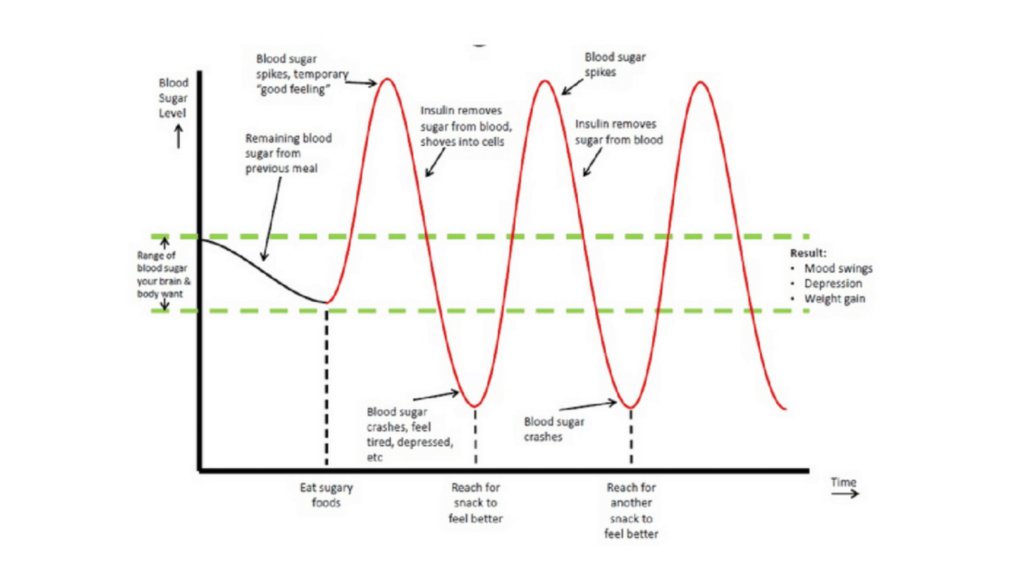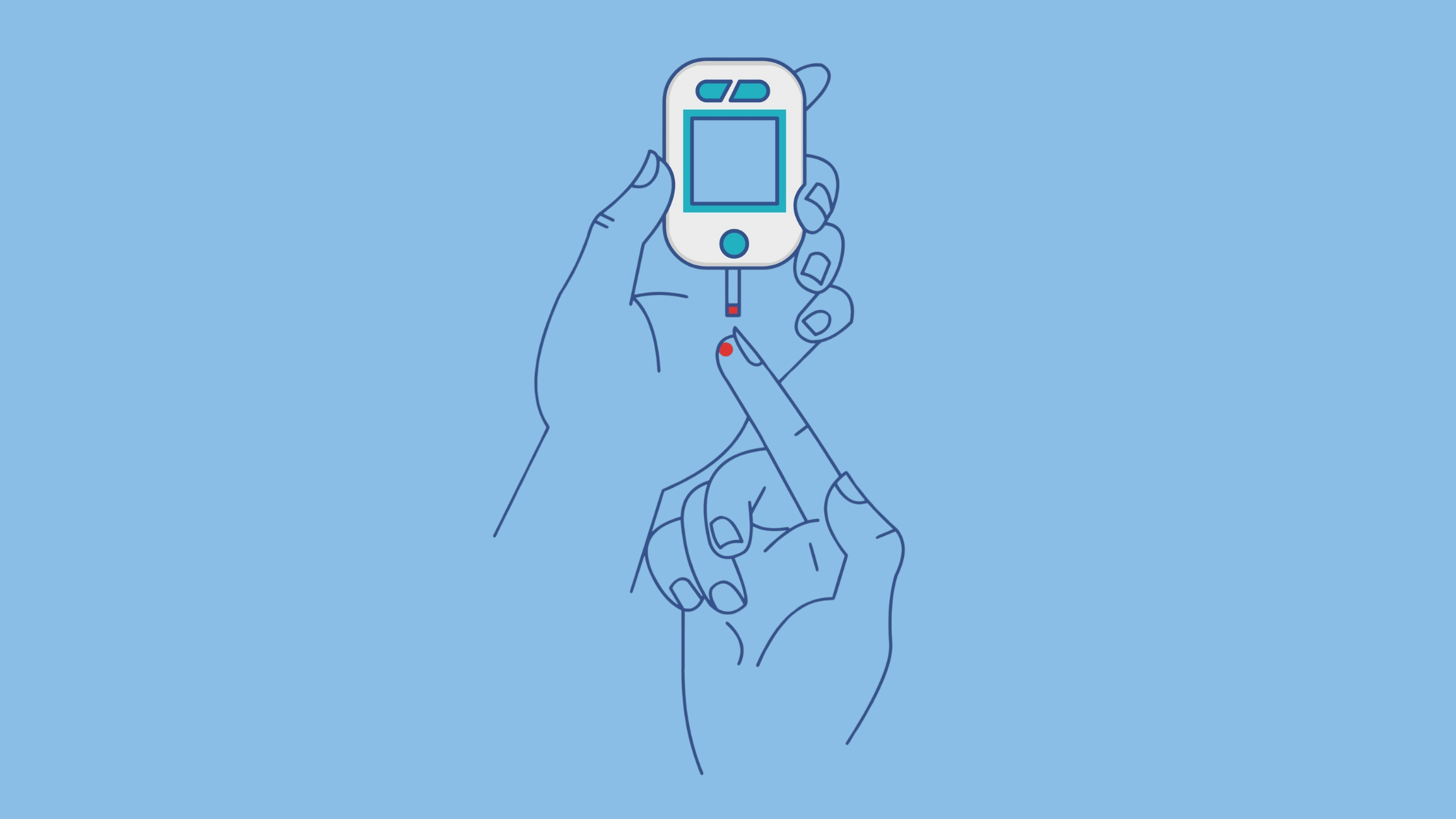Managing blood sugar is essential for maintaining energy, focus, and long-term health. If you constantly battle low energy, mood swings, and light-headedness, it may be a sign that you’re dealing with a blood sugar imbalance. The first step to change starts with understanding how blood sugar works so you can make informed decisions about your health.
The basics of blood sugar
Blood sugar, or glucose, is essential for providing energy to your body, particularly the brain and muscles. Knowing how your body regulates glucose can help maintain steady energy and prevent long-term health problems like type 2 diabetes.
How blood sugar works
Your body has a system that keeps blood sugar levels relatively steady so your cells can function properly. There are three components of this system:
- Pancreas
- Liver
- Blood sugar hormones (insulin and glucagon)
When you consume food, particularly carbohydrates, your body converts it into glucose, causing blood sugar levels to rise. In response, the pancreas releases insulin, enabling cells to absorb glucose for energy, lowering blood sugar levels. If your blood sugar drops too low, the pancreas releases glucagon, which signals the liver to release stored glucose to restore balance.

Our body performs this incredible balancing act daily. However, several factors can disrupt blood sugar levels over time, leading to symptoms and conditions that negatively impact work and daily life. Learning about the symptoms is the first step in identifying whether you suffer from blood sugar imbalances.
Signs you might have a blood sugar imbalance
Blood sugar imbalances often go unnoticed because the symptoms can be attributed to many other causes. Recognizing these signs early can help prevent more serious issues like diabetes or hypoglycemia. When your blood sugar levels fluctuate too much, it affects your body’s ability to produce and use energy efficiently, leading to common symptoms such as:
- Excess weight gain
- Fatigue or feeling sluggish
- Constant hunger, even after meals
- Mood swings or irritability
- Difficulty concentrating or brain fog
- Constant shakiness
- An irregular or fast heartbeat
These symptoms may signal that your body struggles to regulate blood sugar effectively; addressing them early is essential.
What does it mean to have high blood sugar (hyperglycemia)?
High blood sugar, or hyperglycemia, occurs when there’s too much glucose in your bloodstream. This is commonly seen in people with diabetes but can also happen temporarily from stress, overeating, or illness. When your body fails to produce enough insulin or becomes resistant to insulin’s effects (insulin resistance), glucose builds up in the blood instead of entering cells and being used for energy. Common symptoms include:
- Persistent thirst
- Frequent urination
- Blurred vision
- Increased fatigue or lethargy
If left unmanaged, high blood sugar can lead to long-term complications such as nerve damage, kidney disease, and cardiovascular problems. In addition, you can develop insulin resistance, which can lead to the development of type 2 diabetes and excessive weight gain.

What does it mean to have low blood sugar (hypoglycemia)?
Low blood sugar, or hypoglycemia, happens when glucose levels in your blood drop below the normal range. This is often due to skipping meals, consuming too much insulin, or excessive physical activity. Since glucose is the brain’s primary source of energy, a lack of it can cause various neurological and physical symptoms, including:
- Shakiness or trembling
- Sweating or chills
- Irritability or anxiety
- Light-headedness or dizziness
- Confusion or difficulty thinking clearly
Severe hypoglycemia can lead to fainting or seizures if not treated quickly, making it crucial to recognize and manage these symptoms early.
General blood sugar targets
Your blood sugar fluctuates throughout the day depending on how much and when you eat. However, if your body is healthy, it can maintain a healthy range even during extended fasts or big meals. A healthy range for fasting blood glucose (8+ hours) should ideally range between 70-100 mg/dL, while two hours post-meal glucose levels should stay below 140 mg/dL. Exceeding these levels may signal prediabetes or diabetes and should prompt further medical examination.
What contributes to blood sugar imbalances?
Several factors can disrupt your body’s ability to maintain stable blood sugar levels. These factors can work individually or in combination, often making it more challenging to regulate glucose. Understanding these contributors can help you take control of your blood sugar and minimize fluctuations.
Diet
The foods you eat play a significant role in blood sugar levels. Diets high in refined carbohydrates and sugary foods cause blood sugar spikes, while foods with a lower glycemic index, such as whole grains, healthy fats, fiber, and proteins, help to keep glucose levels relatively stable. Poor dietary habits like consuming excessive sugars, processed foods, and skipping meals can lead to issues with blood sugar regulation.
Medications
Certain medications, such as steroids, antipsychotics, and some diuretics, can cause fluctuations in blood sugar levels. People managing diabetes with insulin or other glucose-lowering medications may also experience imbalances if doses are incorrect or missed.
Dehydration
When the body is dehydrated, blood sugar levels can increase because less water is available to balance glucose concentration in the bloodstream. Additionally, dehydration can make it harder for the kidneys to filter out excess sugar, further elevating levels.
Weight
Being overweight or obese increases insulin resistance, which makes it more difficult for the body to use insulin effectively. As a result, blood sugar levels remain elevated, increasing the risk of developing type 2 diabetes. Maintaining a healthy weight through diet and exercise can improve insulin sensitivity.
Stress
Stress hormones like cortisol and adrenaline can raise blood sugar levels. When the body is under stress, it prepares for a “fight or flight” response, triggering the release of stored glucose for energy. Chronic stress can lead to consistently elevated blood sugar levels, especially in those already predisposed to diabetes.
Inactivity
Lack of physical activity can cause the body to become less sensitive to insulin, leading to higher blood sugar levels. Regular exercise helps your muscles use glucose more efficiently, reducing the chances of imbalances. Even moderate physical activity like walking can improve insulin sensitivity, especially after meals.
Poor sleep
Poor or insufficient sleep can interfere with the body’s ability to regulate insulin and blood sugar. Studies have shown that sleep deprivation increases insulin resistance and can cause blood sugar to rise. Getting enough quality sleep is crucial for stable blood sugar levels.
Dietary culprits of blood sugar imbalances

Refined carbohydrates
Refined carbohydrates, like white bread, pastries, and pasta, are quickly digested and broken down into glucose. This rapid breakdown causes a spike in blood sugar, as these foods lack the fiber necessary to slow glucose absorption. Over time, frequent consumption of these foods can lead to imbalanced blood sugar levels and insulin resistance.
Sugary beverages
Sugary drinks, such as sodas, sweetened teas, and energy drinks, are absorbed quickly by the body. Since they lack fiber, protein, or fat to slow digestion, these beverages can lead to sharp spikes in blood glucose, making them particularly harmful to blood sugar management.
Processed snacks
Highly processed snacks like chips, cookies, and candies are full of simple sugars that cause an immediate rise in blood sugar. These snacks offer little nutritional value, lacking the nutrients that would otherwise buffer glucose absorption.
Fruits with a high glycemic index
Certain fruits, such as watermelon and ripe bananas, have a high glycemic index. This means they can elevate blood sugar levels more quickly than other fruits, which can pose a problem for individuals trying to manage their glucose levels.
UTHH’s top 6 tips for better blood sugar balance
1. Combine protein, fat, and fiber (PFF) with every meal

A combination of protein, fat, and fiber in every meal helps slow down carbohydrate absorption, preventing spikes in blood sugar. While all three aren’t essential at every meal, it’s a good practice to incorporate them. Foods like whole grains, leafy greens, nuts, chicken, beans/legumes, and fish are great choices to help you get these nutrients.
2. Stay hydrated

Proper hydration is often overlooked when maintaining balanced blood sugar levels. However, it’s just as important as the other factors here, as drinking enough water helps the kidneys eliminate excess glucose through urine. On the other hand, dehydration can cause blood sugar levels to rise as the glucose in the bloodstream becomes more concentrated. Therefore, having a balanced water intake is critical. Aim for about eight cups of water or enough to avoid spells of heavy thirst. Increasing your intake to counteract sweating if you’re working in a hot climate.
3. Prioritize physical activity and walking

Physical activity helps muscles absorb glucose more efficiently, which helps lower blood sugar levels. This is especially true after a meal. Taking even a five-minute walk after eating a meal has been proven to have a measurable effect on moderating blood sugar levels. However, aiming for at least 10-15 minutes, if not even more, is best to maximize the impact. These benefits are available within the first 60 to 90 minutes after a meal.
4. Limit refined carbs and sugars

Switching from refined carbs to whole grains, legumes, and non-starchy vegetables can prevent sudden blood sugar spikes. Whole foods contain fiber, slowing glucose absorption and stabilizing blood sugar levels.
5. Get enough sleep

Ensuring 7-9 hours of quality sleep per night can help the body regulate glucose more effectively and reduce the risk of blood sugar imbalances. If you’re struggling to get quality sleep, ensure your sleep environment is conducive to a good night’s rest, or consider using sleep supplements temporarily.
6. Manage stress

Studies have shown that chronic stress leads to elevated cortisol levels, a hormone that increases blood sugar. Stress-reducing techniques like meditation, deep breathing exercises, or yoga can help regulate cortisol and maintain healthy blood sugar levels.
Bottom line
Maintaining balanced blood sugar is essential for productivity and energy levels, whether behind a desk or hustling on a construction site. By incorporating regular physical activity, eating balanced meals with protein, fat, and fiber, and managing your sleep, you can avoid the crashes that often come with blood sugar spikes. But you don’t have to start by trying all these tips at once. Instead, it’s better to choose one small change and stick with it until it becomes a habit. That way, you ensure you’re not overwhelmed and have a greater chance of turning it into a lifestyle change.



4 comments